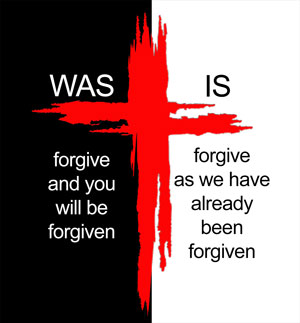
Will God Forgive Me If I Don’t Forgive Others?
by Jeff Fields
When it comes to the subject of forgiving others, the New Testament includes verses that, at face value, contradict each other. The key to understanding them is to view them through the lens of the cross. If we do not view them in light of what happened at the cross, we will end up with a confusing message that lacks the power of the gospel. Without an understanding of the glory of the new covenant, we will end up teaching that unforgiveness is the unforgivable sin.
Jesus repeatedly taught his listeners that if they want to be forgiven by God, then they must first forgive others (Mt. 6:12, 14-15). In the story of the unforgiving servant (Mt. 18:21-35), the servant lost his pardon because he did not forgive others. We will come back to that story. Those passages make it look like God will only forgive our sins if we first forgive others. In other words, unforgiveness is an unforgivable sin. Without the cross, those teachings are threatening and strike fear in our hearts. They sound like God will condemn us and yank our forgiveness away if we don’t forgive someone.
On the other hand, Paul’s encouragement to believers in Christ has a completely different tone. Ephesians 4:32 says, “Be kind to one another, tenderhearted, forgiving each other, just as God in Christ also has forgiven you” (NASB). In Colossians 3:12-13, he writes, “So as those who have been chosen of God, holy and beloved, put on a heart of compassion, kindness, humility, gentleness, and patience; bearing with one another, and forgiving each other, whoever has a complaint against anyone; just as the Lord has forgave you, so also should you” (NASB). In those verses, we are encouraged to forgive others, but there is no threat of punishment if we do not forgive.
In order to “rightly divide the word of truth” here, we must recognize the cross of Christ as the dividing line between the old and new covenants.
So how do we handle the apparent contradiction between Jesus and Paul? Jesus seems to teach that we forgive others first, and then God forgives us. Paul taught that God forgives us first, and then based on that, we forgive others. In order to “rightly divide the word of truth” here, we must recognize the cross of Christ as the dividing line between the old and new covenants.
The Divide of the Cross
Jesus and Paul were speaking to two very different audiences. Jesus was speaking to those still under the old covenant. The new covenant had not yet come. Paul, on the other hand, was speaking to believers in Christ who were under the new covenant. Jesus was speaking to those under the law. Paul was speaking to those under grace. Jesus was speaking to those in need of a new heart. Paul was speaking to those who already had a new heart in Christ.
In between those two settings, something happened! The cross happened! In between Jesus and Paul, the old covenant ended and the new covenant started! We must look at Scripture with the cross in mind. The cross is the dividing line. We can look at Scripture through a lens of law (before the cross) or through a lens of grace (after the cross).
The Unforgiving Servant
Let’s look again at the story of the unforgiving servant in Mt. 18:21-35 through the lens of grace. It is a fascinating story. A servant (not a son) owes a king (not his father) an enormous debt. The servant asks, not for grace and complete forgiveness, but for patience and an extension of time. “…And I will pay you everything” (v. 26).
The king actually gives him more than requested. He releases the servant and forgives the debt. Sadly, though, servant #1 uses his new found freedom to chase down servant #2 who owes money to servant #1. Servant #1 has servant #2 put in prison. The unforgiving servant who was forgiven a huge amount shows no mercy to someone who owes him a very small amount. The king hears about this as other servants, #3 through whatever, tattle on servant #1. In an unfortunate turn of events, the king withdraws the forgiveness that was given to servant #1 and has him delivered over to the jailers (probably not very nice people) until the debt is paid.
Then, Jesus ends the story with this warning, “So also my (notice not ‘your’) heavenly Father will do to every one of you, if you do not forgive your brother from your heart” (v. 35). Wow! That is harsh. That is strict. Yes, it is harsh and strict because the law is ALWAYS harsh and strict.
Jesus wants Peter to see his own hopeless situation under the law.
The point is this: Jesus was telling this story to those under the law in order to help them see the impossibility of meeting the incredibly high standard of the law of the King. Under the law, unforgiveness is not forgiven. Jesus told this story in response to Peter’s question about forgiving his brother up to seven times. Jesus wants Peter to see his own hopeless situation under the law.
The story of the unforgiving servant is the bad news that prepares us for the good news. Apart from Christ, we are all like the unforgiving servant. There is none righteous. No not one. The message of this story is not that we should all try harder to forgive others so God won’t yank away our forgiveness. That would be a rather self-centered motivation, wouldn’t it?
The Point of the Story
The message of this story in Matthew 18 is that the unforgiving servant represents each one of us. Without Christ, we all end up in the hands of the jailors at the end of this story. That is the end of THIS story, but it is not the end of THE story. There is good news!
While none of us, in our own flesh, can forgive others from the heart, Jesus did just that. On the cross, he said, “Father, forgive them, for they know not what they do” (Lk. 23:34). He not only met the standard of the law in full for us, he paid the price for our inability to keep the law. As in the story of the unforgiving servant, He was handed over to the jailers until the debt would be paid in full and that is exactly what He did. He paid the debt in full! He paid the price that all of us “unforgiving servants” owed.
If we teach the story of the unforgiving servant as a way to threaten believers to try harder to forgive others, we are overlooking the cross.
This passage is a warning for anyone trying to be good enough to be right with God and it is a passage to remind us of the debt that Jesus paid. It is NOT a passage intended to scare those who are in Christ. If we teach the story of the unforgiving servant as a way to threaten believers to try harder to forgive others, we are overlooking the cross. We also end up teaching that unforgiveness cannot be forgiven. In effect, we end up saying that the sacrifice of Jesus on the cross did not pay for the sin of unforgiveness.
This is why the writers after the cross, who were writing to believers in Christ, never used threats like the story of the unforgiving servant. Rather than warn us to forgive out of a fear of losing our forgiveness, they point us to Christ and our forgiveness in Him. They did occasionally warn unbelievers (Hebrews, I John) about the consequences of not believing in Christ, but to believers, the message was different. They encouraged us to forgive freely as we have already been forgiven.
I mean, really now, isn’t that the only way forgiveness can be genuine? If I forgive others out of a fear of losing God’s forgiveness, what good is that? That is definitely NOT from the heart. That would be by my own fleshly desire to save my own neck.
The Good News
We do not attain or hold on to God’s forgiveness by our faithfulness in forgiving others. The gospel is not “justification through faith in Christ plus our willingness to forgive others.” Think about it. If God only forgives us if we forgive others, that would not be salvation by grace. That would be salvation by grace plus a willingness to forgive others.
The good news of Jesus Christ is that when He died for us on the cross, He died for ALL of our sins – even the sin of unforgiveness.
Also, if God repossesses our forgiveness when we do not forgive others, is that how we are to forgive others? Are we only to forgive others who in turn forgive those around them? Do we take back our forgiveness if someone who wrongs us does not forgive someone who wrongs them? See how messed up it gets? Does God call us to forgive others to a greater degree than He forgives us? No. We are called to forgive others unconditionally and that is how God has forgiven all those in Christ. Our forgiveness in Christ is free and complete through simple faith.
The good news of Jesus Christ is that when He died for us on the cross, He died for ALL of our sins – even the sin of unforgiveness. When we initially put our faith in Jesus Christ and open our heart to Jesus Christ, we receive Him once and for all. With Him came the forgiveness. Our forgiveness is in Him (Eph. 1:7).
Are we, as believers in Christ, called to forgive those who wrong us? Absolutely! That is part of loving one another. The reason, though, is not because we fear God is going to change His mind about forgiving us. We are called to forgive others as we have already been completely and eternally forgiven in Christ. In the new covenant on this side of the cross, we have a new heart. It is our new nature to forgive as we have been forgiven. We are free to forgive.
Will God forgive me if I don’t forgive others? The good news is that, in Christ, He already has.
Book about spiritual freedom
by The Fields Brothers
Breaking The Hex:
Life With God After The Cross Killed Religion
By Roger Fields and Jeff Fields

